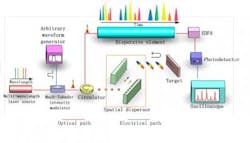Ultrafast real-time optical imaging is an effective and important tool for studying dynamic events such as shock waves, neural activity, laser surgery, and chemical dynamics in living cells at frame rates far beyond those attainable using CCD or CMOS sensors. A group at the Institute of Semiconductors, Chinese Academy of Sciences (Beijing, China) has now improved on a recently developed ultrafast imaging technique called serial time-encoded amplified microscopy (STEAM).1
STEAM, which is based on space-frequency mapping combined with frequency-time mapping, has been demonstrated to be a completely new optical imaging approach. By employing a spatial disperser and a dispersive element, spatial information is converted to a serial sequence in time that can be detected with a single-pixel photodiode and captured by a real-time oscilloscope.
However, these methods need a large and high-cost pulsed laser; for this type of laser, the spectral width is generally limited to about 10 nm, limiting the measurement range. In addition, the pulse-repetition rate is fixed to dozens of megahertz, which in turn means that the imaging frame rate is also fixed to dozens of megahertz.
STEAM with a multiwavelength laser
Professor Li Ming and his group have developed a STEAM system using a multiwavelength laser to overcome those limitations. Based on mutually phase-uncorrelated lasing lines, the system avoids the need for a broadband coherent laser light source along with the associated limitations on the measurement range and the imaging frame rate.
In comparison to a pulsed laser, the use of a multiwavelength laser as the light source can reduce the cost of a STEAM system. In addition, the measurement range can be largely extended by simply increasing the number of wavelengths. The frame rate is also reconfigurable by electrically tuning the gating rate. A frame rate up to 250 MHz is experimentally obtained in this work.
With the development of photonic integrated circuits (PICs), the multiwavelength laser source has the potential for integration on a photonic chip and thus the size and cost of the STEAM system could be largely reduced in the future.
Source: http://www.eurekalert.org/pub_releases/2014-07/scp-sta072814.php
REFERENCE:
1. Ye Deng et al., Chinese Science Bulletin (2014); doi: 10.1007/s11434-014-0381-8

